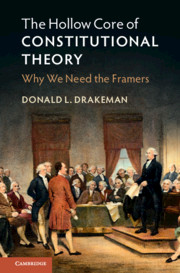Book contents
- The Hollow Core of Constitutional Theory
- The Hollow Core of Constitutional Theory
- Copyright page
- Contents
- Preface
- 1 The Framers and Contemporary Constitutional Theory
- 2 The Framers’ Intentions
- 3 Original Methods and the Limits of Interpretation
- 4 Original Methods Updating
- 5 The Semantic Summing Problem
- 6 Is Corpus Linguistics Better than Flipping a Coin?
- 7 The Framers’ Intentions Can Solve the Semantic Summing Problem
- 8 Interpretation and Sociological Legitimacy
- 9 Noninterpretive Decisions
- 10 Conclusion
- Bibliography
- Index
8 - Interpretation and Sociological Legitimacy
Published online by Cambridge University Press: 26 January 2021
- The Hollow Core of Constitutional Theory
- The Hollow Core of Constitutional Theory
- Copyright page
- Contents
- Preface
- 1 The Framers and Contemporary Constitutional Theory
- 2 The Framers’ Intentions
- 3 Original Methods and the Limits of Interpretation
- 4 Original Methods Updating
- 5 The Semantic Summing Problem
- 6 Is Corpus Linguistics Better than Flipping a Coin?
- 7 The Framers’ Intentions Can Solve the Semantic Summing Problem
- 8 Interpretation and Sociological Legitimacy
- 9 Noninterpretive Decisions
- 10 Conclusion
- Bibliography
- Index
Summary
Previous chapters have focused primarily on factual issues bearing on theories of constitutional interpretation. This chapter turns toward perceptions as it explores how both elite and popular opinion influence the justices’ perspectives on interpretive issues. These perception issues fall generally into the Court’s need for what Richard Fallon has called “sociological legitimacy,” along with the individual justices’ views of their “fidelity to role,” as described by Lawrence Lessig. The specific issues addressed are aspects of what are sometimes considered “conventional wisdom,” and they turn out not to be true. The first is the notion that any interpretive approach based on the Framers’ understandings is so far out of step with the contemporary thinking in the international community of judges and scholars that it represents little more than a peculiarly American form of “ancestor worship,” and the second is the belief that calling on the Framers’ understandings is principally a tool for advancing conservative social and political views.
Keywords
- Type
- Chapter
- Information
- The Hollow Core of Constitutional TheoryWhy We Need the Framers, pp. 155 - 177Publisher: Cambridge University PressPrint publication year: 2021

